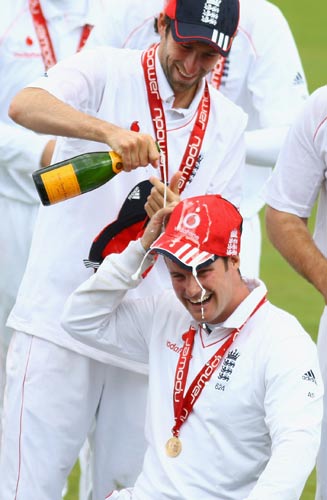England hit form but Australia lie in wait

Andrew Strauss may be right to believe that winning cricket matches is the ideal preparation for winning more, but if he thinks that a 2-0 whitewash of the West Indies is anything more than a useful warm-up for the Ashes, he need only take a look around his county dressing room.
While Strauss has been captaining England to an admittedly emphatic series win, Australia's Phillip Hughes has been averaging 143.5 for Middlesex, treating the county game as glorified net practice.
The response to England's success in the British media was anything but euphoric, with the England and Wales Cricket Board attracting vitriolic criticism for arranging a series against apparently disinterested opponents.
"What really is the point of this ludicrous two-match series?" wrote Martin Johnson in the Sunday Times. "If you want the game to thrive, you have to give people a contest that actually means something — and, for preference, at a time of year when furry animals have finally come out of hibernation."
And if scheduling a test series in an English May was asking for trouble, staging a test in Chester-Le-Street in northern England, where the average temperature at this time of year is 9.6 degrees, was begging for it.
Attendances, except on Saturday, were dismal, with television cameras showing banks of empty seats and what few spectators there were huddled under blankets.
Then there was the financial cost. England was originally supposed to play Zimbabwe, but when they were stripped of test match status in January, 2006 Sri Lanka was asked to step in. They declined, forcing England to call West Indies, whose fee was already significantly higher than Zimbabwe's.
When England subsequently won the first test inside three days, the ECB was forced to refund 20,000 fans who had tickets for Saturday's play.
Chief Executive David Collier claimed the exercise was useful preparation.
"I think that it would have been wrong not to have any Test matches prior to us playing in an Ashes series," he said. "I think people would have asked why are we giving Australians an advantage when we have played no test match cricket, no four-day cricket."
Collier cited the case of Ravi Bopara, who scored centuries in both tests.
"Would it have been beneficial for him to be thrown straight into an Ashes test match or would it be beneficial for him to have the opportunity of a couple more test matches?" Collier said. "That's a judgment call, we accept that, but we believe that on balance we would have been criticized had we not given people the opportunity."
But was this preparation any better than that offered to Hughes by county bowlers?
Former England captain Michael Atherton didn't think so, describing the West Indian performance as "supine" and captain Chris Gayle hinted at his side's lack of interest when he said, "I wouldn't be so sad if test cricket died."
For motivation alone, Australia will be drastically different. Buoyed by a resounding series win in South Africa that restored them to the top of the World rankings, they will also benefit from the insider knowledge Hughes has gathered during his time at Middlesex according to the ECB's chairman of selectors Geoff Miller.
"It's disappointing," he said. "My role is not to tell the counties how to run their businesses, but, from an England point of view, it does not help our Ashes situation. We are giving (Hughes) the opportunity to use our conditions for the first time."
This was rejected by Middlesex's managing director Angus Fraser, himself a former England bowler.
"I can understand why some people have questioned Middlesex's motives in an Ashes summer, but people need to grow up a bit," he said. "We want a good, competitive Ashes, two good sides playing it and England to win. I don't think giving a 20-year-old half a dozen games in England in April and May is going to have a huge effect. We signed (Hughes) in mid-January before he had been picked for the squad for South Africa where he scored a hundred in each innings of his second Test."
Middlesex's gain may well be England's loss.
Join our commenting forum
Join thought-provoking conversations, follow other Independent readers and see their replies
Comments
Bookmark popover
Removed from bookmarks